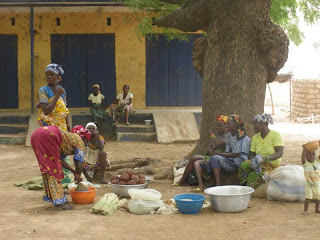I have just got back from a fascinating and eye opening trip to a remote area of West Mamprusi District called "Overseas.” It is so named because it is cut off during the rainy season (May to September) due to the numerous rivers crossing the land. There have recently been a couple of bridges constructed, but it is basically a very isolated area and teachers do not want to go there because life is hard.
I have blogged 13 (mostly short) entries about the trip - you may have to use the 'Older posts' link bottom right to see them all.
Many children had never seen a white person before and I caused a real stir everywhere we stopped. I began to perfect my royal wave.
I have blogged 13 (mostly short) entries about the trip - you may have to use the 'Older posts' link bottom right to see them all.
Many children had never seen a white person before and I caused a real stir everywhere we stopped. I began to perfect my royal wave.
 Our trip lasted a whole week and was a joint venture between WorldVision and the Ghana Education Service. Our mission was to educate the School Management Committees (Governors) and Parent Teacher Associations as to their roles and responsibilities. Radically, I suggested we include some group work and each afternoon we split the attendees into school groups and got them to make a draft SPIP - School Performance Improvement Plan. This was a huge step forward as most of the committees had just been formed for the purpose of attending the training and had absolutely no idea what they were there for.
Our trip lasted a whole week and was a joint venture between WorldVision and the Ghana Education Service. Our mission was to educate the School Management Committees (Governors) and Parent Teacher Associations as to their roles and responsibilities. Radically, I suggested we include some group work and each afternoon we split the attendees into school groups and got them to make a draft SPIP - School Performance Improvement Plan. This was a huge step forward as most of the committees had just been formed for the purpose of attending the training and had absolutely no idea what they were there for.Group work.
Here I am trying to be helpful. There was always at least one english speaker in each group and he then translated for the rest.

















































